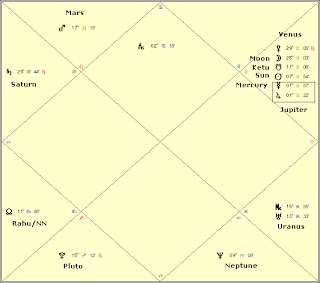While I thought we might have seen a little more downside on the strength of the two Saturn aspects in play, the week unfolded more or less as expected. I thought the early week Venus aspect could reflect a relative calm after the Greek election result and that is essentially what happened. While the post-election relief rally quickly fizzled, at least the doom and gloom scenario of a anti-bailout Syriza win did not come to pass. I thought that the downside was more likely to arrive after the Wednesday Fed meeting and indeed the market sold off after Bernanke chose the more conservative option of Operation Twist instead of QE3. This coincided nicely with the bearish Mercury-Saturn aspect and we got a big decline on Thursday with gold and oil also participating.
Europe remains the focus of the financial world this week as its leaders will meet in summit on Thursday and Friday. Opinion is divided over whether they will be able to deliver fresh solutions to the debt crisis, or even if the market needs them to do so. Few are expecting a comprehensive program to emerge from the meeting, but the markets would like to see something tangible that goes beyond the usual boost in the size of the ESM and EFSF bailout plans. It is fascinating to see how the current financial crisis is reflected in the planetary geometry. Bearish Saturn is about to station and return to normal forward motion while disruptive Uranus makes its exact square aspects with power-hungry Pluto this weekend. These are clearly troubled times in the financial world and the planets are echoing that reality. Even more interesting is how the current crisis bears a resemblance to the European banking crisis of 1931. At that time, there was a similar crisis of excess debt that bankrupted many banks in Europe and around the world. Bank runs were common in 1931 as Austrian and Germany banks became insolvent in the face of an ever deepening depression. It is not coincidental that we see some of the same planetary aspects then as we do now. In 1931, there was also a rare Uranus-Pluto square aspect in play. This wasn't quite exact yet, but it was still within just one degree. It is worth pointing out that this Uranus-Pluto square aspect occurs only once every 70-80 years and the last time is happened was 1931-1933. The planetary picture in the early 1930s was considerably darkened by the aspect from Saturn that formed a t-square with Uranus-Pluto. Saturn is less prominent this time around as we can only point to a weaker 8th harmonic aspect, but it is still there. This is perhaps one reason why the crisis so far has not been as bad as the 1930s. Of course, the Uranus-Pluto square lasts a long time so it will be in effect until 2014.
This week could bring some important new developments. The Uranus-Pluto square is exact on Sunday and may be activated the Sun's transit on Friday the 29th. This will form a very tense t-square aspect and could release some of that disruptive and disorderly Uranus energy. Since this happens on the same day that the EU summit is wrapping up, it is tempting to think about possible scenarios that could correspond to the symbolism of this aspect. Since it does look tense, this would tend to support the view that the EU does not solve its problems this week. Perhaps this means that pro-austerity Merkel holds out against all the calls by Hollande, the IMF and the ECB to stimulate the European economy. And yet since these aspects are so close to exact, it also seems plausible that this week will bring some kind of resolution. The markets may react negatively at first, but there is some reason to expect at least a temporary solution to come forth. Before Friday's t-square, Saturn turns direct on Monday while in a very tight and potentially negative aspect with Venus. For its part, Venus also turns direct on Wednesday, so this is another reason to be extra cautious here. Planetary stations generally represent increases in energy which can accompany major developments and adjustments. They are also partially correlated with reversals in market direction.
Transits for Friday 29 June 2012 9.30 a.m. New York

















